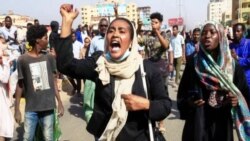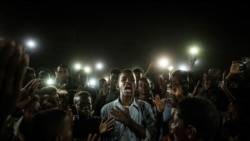On November 1, Sudan’s top military official, Gen. Abdel-Fattah Burhan, told the Arabic language service of the Russian-state broadcaster Sputnik, that the military takeover he led last week was necessary to tackle “disorder” in the country’s transition to democracy.
Burhan said the international backlash against the move was expected. He accused news media of misleading reporting about Sudan. Burhan described the takeover as similar to what happened in April 2019, when Sudan’s army overthrew President Omar al-Bashir after months of mass protests.
“Whoever thinks that this is a coup, just look at any corrective movement in the government like April 12, which could be thought of as a coup,” he said.
That is misleading. In fact, the army violated an agreement signed with pro-democracy protesters in 2019 just a few weeks before a planned transfer of power to civilian leaders.
It’s worth noting Burhan’s use of the term “corrective movement.” The late Syrian president Hafez al-Assad used the same euphemism following a coup d’état he led in 1970.
At the time, Assad was head of Syria’s air force and defense minister. He arrested and imprisoned rivals in the government, including the country’s then-de facto leader, Gen. Salah Jadid, and went on to rule Syria for 30 years until his death in 2000. His son, Bashar, succeeded him and still does.
Fast forward to October 25 in Sudan. Burhan decided to oust his rivals in the government, arresting Prime Minister Abdalla Hamdok and dissolving the transitional government.
In this case, the expelled and arrested officials are part of the civilian wing of Sudan’s current ruling authority. Burhan’s power grab came just before the military was set to step aside in November and let a civilian head the government prior to general elections (originally set for 2022, then postponed until 2023.)
Omar al-Bashir, who ruled Sudan for three decades, seized power in a military coup in 1989, during a civil war between north and south Sudan. The International Criminal Court (ICC) accused Al-Bashir of war crimes and crimes against humanity and issued a warrant for his arrest.
In 2020, the United States removed Sudan from its list of countries designated as state sponsors of terrorism. Sudan had been put on the list for sheltering Osama bin Laden and involvement in the bombings of the U.S. embassies in Kenya and Tanzania in 1998, and the USS Cole warship in 2000.
A pro-democracy movement emerged in Sudan in December 2018, as the country experienced an economic crisis. Protests began in Atbara, north of the capital Khartoum, and spread to other parts the country. Demands for al-Bashir’s resignation escalated.
In April 2019, Sudan’s military removed al-Bashir and declared a state of emergency. The pro-democracy movement, a mix of unions, political parties and youth groups, decided to stay in the streets and insist that a civilian government replace decades of military control.
Though al-Bashir was out, a bloody standoff between the army and protesters left more than 100 dead. Dozens of women were raped.
The African Union brokered negotiations that led to signing of a constitutional declaration in 2019. That deal was followed by the Juba Agreement for Peace in Sudan, signed in 2020 between a sovereign council headed by Burhan and rebel groups.
In September, however, military leaders accused the civilian leaders of attempting a coup, and divisions grew. On October 16, a group of civilians and former rebels staged a sit-in at the presidential palace, calling for the dissolution of Hamdok’s government and an army takeover.
Last week, the army suspended several articles in the 2019 declaration, including those related to the shape of the transitional government and its authority. That move is hindering efforts to form a stable civilian government.
In response, hundreds of thousands of people took to the streets in protest, shouting “no to military rule, yes to civilian rule.” Several were shot dead, and at least were 100 injured.
Human right groups fear that Burhan’s move will cause harm. On October 26, Human Rights Watch (HRW) urged the military to refrain from using force against civilians, free political leaders and restore communications.
“The military junta should not jeopardize the sacrifices and hard work of Sudanese from all walks of life for a fairer, more rights-respecting Sudan,” HRW said.
U.N. Secretary General António Guterres condemned the coup and called for an “immediate reconstitution” of the government and release of Hamdok and other government officials.
On October 28, U.S. President Joe Biden joined other world leaders and groups condemning the military takeover. “The Sudanese people must be allowed to protest peacefully, and the civilian-led transitional government must be restored,” Biden said in a prepared statement.
On October 26, the African Union Peace and Security Council (PSC) suspended Sudan’s participation in African Union activities until the country’s civilian-led authority is restored.








